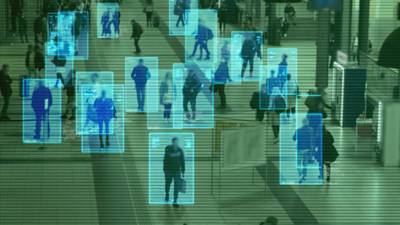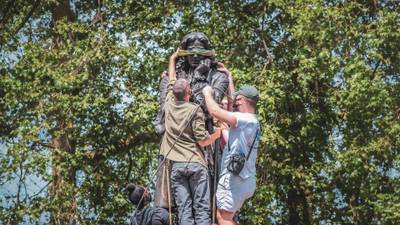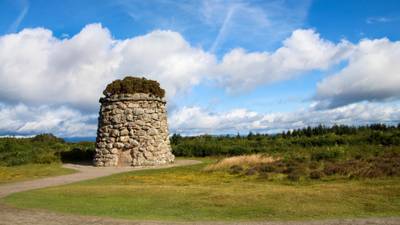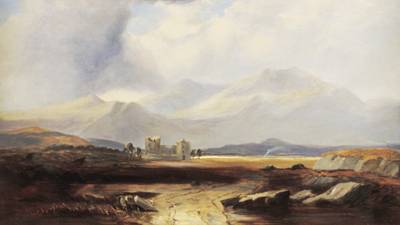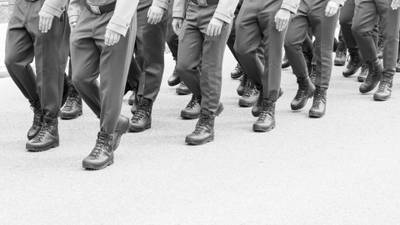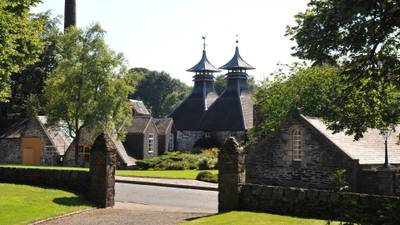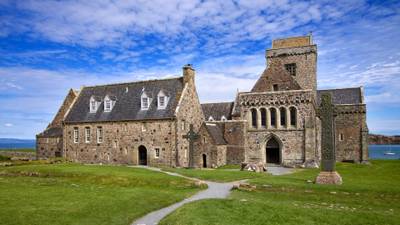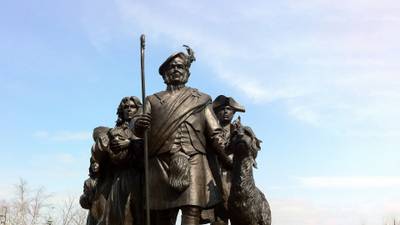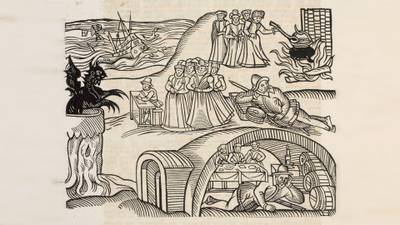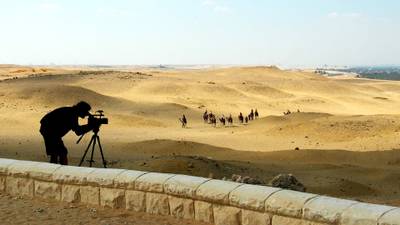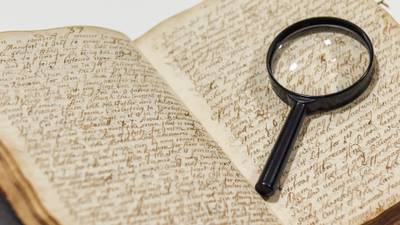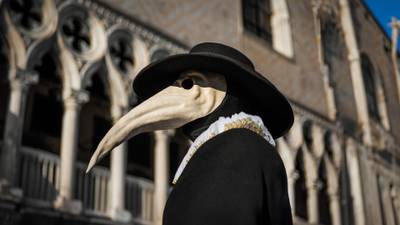Join our online Scottish history course and discover the remarkable story of Scotland.
Access fascinating source materials as you evaluate Scotland’s global impact over the past millennium.
From the Highland Clearances to the country’s emergence as a tourist haven, you’ll cover a broad range of themes that span the medieval period to the modern day.
As well as deepening your knowledge of Scottish history, you’ll build your academic expertise. You’ll learn to evaluate sources and undertake independent research of your own.
Who can join this online Scottish history course?
This flexible and fully online course is for anyone, anywhere in the world, with a professional or personal interest in Scotland’s history and heritage.

Build credits towards a Masters degree
This online course is part of:
You can use the credits you earn on this short course towards this MLitt qualification.
What you’ll study
You’ll study a broad sweep of Scottish history, from the early medieval period through to modern Scotland.
You’ll explore a wide range of themes to give you an all-encompassing understanding of the development of Scotland, including:
- government
- war and conflict
- religion
- Anglo-Scottish relations
- mobility
- travel and tourism
- urban and rural life
- Highlands and Islands
- Enlightenment
- Jacobitism
- housing and health.
You’ll take a global view, connecting this rich heritage with today’s Scottish diaspora.
You’ll cover the following modules on your course:
- Why Scottish history matters
- Medieval turbulence and bloodshed: the wars of Scottish independence
- Government and society during the Renaissance: the Stewart dynasty
- Rocked by the Reformation: compare articles on witchcraft trials in Scotland
- Into the 17th century: what was the ‘Covenanting revolution’?
- Parliamentary union with England
- The Scottish Enlightenment
- Examining the Enlightenment: studying The Statistical Account of Scotland, with fascinating snapshots of life in the 1790s and 1830s/40s
- Scottish Romanticism
- Entering the modern era: industrialisation, urbanisation and mobility
- 19th-century dislocation: the disruption of the established church, changes in farming, and the Highland Clearances
- The Scottish imagination: changes in how Scots perceived themselves from medieval through to modern times.

Studying 1,000 years of Scottish history is more than just a timeline of events. Rather, it’s a fascinating look into complex issues that influenced the unique Scottish national identity.
Alanna MacTavish Khalil, online MLitt Scottish Heritage student
By the end of this course, you’ll be able to…
-
Discuss a range of themes and events in a millennium of Scottish history.
-
Show critical and comparative appreciation of key debates and controversies.
-
Display skills in intellectual debate and constructive criticism.
-
Evaluate primary and secondary sources.
Choose the University of Aberdeen for online Scottish history courses
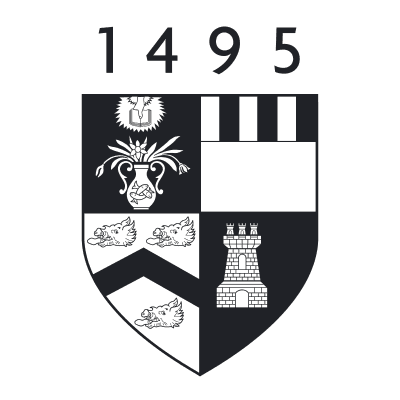
Over 525 years of excellence
Study with the fifth-oldest university in the English-speaking world, founded in 1495.

Learn anywhere
On smartphone, desktop and laptop, with no need for a student visa.
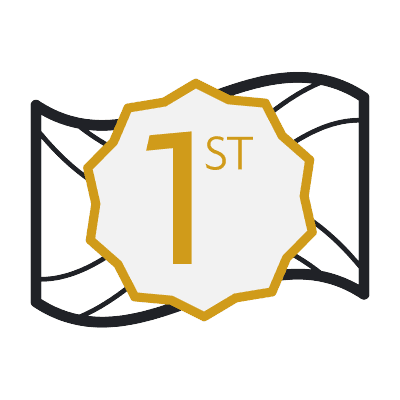
1st in Scotland for History
Our History department is ranked 1st in Scotland for overall student satisfaction in the National Student Survey 2024.
How you’ll study
Online learning
This distance learning Scottish history course is delivered flexibly, 100% online.
You can learn with us anywhere in the world, no student visa required, and manage your study hours to suit you.
Your teaching
This course is taught at Masters level.
Teaching is delivered through MyAberdeen, our online Virtual Learning Environment (VLE). It holds all the materials, tools and support you’ll need in your studies. Take a look around MyAberdeen.
You can access your learning materials on computer, smartphone and laptop, 24 hours a day. You’ll find a range of online resources available, including:
- lectures
- videos and audio clips
- quizzes
- reading materials
- discussion boards with your tutors and peers
- online access to our remarkable University Collections and award-winning Sir Duncan Rice Library.
The main interaction on the course takes place through the online discussion boards. You’ll interact with each week’s subject through these discussions. Typically, there will be 8–10 discussion questions set each week.
Unique archive access
You’ll enjoy access to a rich stream of written, visual and oral source materials from within the University and across Scottish archives.
You’ll be able to explore our outstanding University Collections and the Sir Duncan Rice Library online. These include ancient Scottish records, manuscripts, prints, photographs and literary collections of leading Scottish writers and poets. Treasures include a large Jacobite collection, works of the Scottish Enlightenment, and one of the best collections of Sir Walter Scott’s work.
Your tutors
This course is delivered by the School of Divinity, History, Philosophy and Art History.
You’ll learn from academics from our department of History.
This course is assessed entirely online.
You’ll be assessed via these written assignments:
- Historiographical exercise (worth 20% of your final grade)
- Comparison of parishes in The Statistical Account of Scotland (20%)
- 3,000-word essay (60%)
This course totals approximately 300 hours of study and assessment time.
That’s around 15 – 20 hours per week in regular topic work and independent study, with more time required around assessments.
This is an indicative guide to the time required for a typical student at this level to achieve the learning outcomes. This includes time for independent study, as well as teaching and assessments.
You can largely set your own study hours to cover the materials. MyAberdeen is available 24/7, so you can log in and study when it suits you.
Activities at fixed times
There may be some activities scheduled at fixed times, such as online meetings with your tutor or assessments with deadlines. But otherwise, you can access and work through the course at your convenience.
Our first-class support structure will ensure that you aren’t alone in your studies.
You’ll have contact with your coordinator via email, MyAberdeen, Microsoft Teams, or phone. You can use social media and discussion boards to chat with your fellow students too.
We provide a wide range of services to support you in your studies and beyond:
- Careers and Employability Service
- Disability support
- IT support
- Library support
- Student Support Service – help with finances, wellbeing and non-academic issues
- Student Learning Service – study support, with advice sessions available
- Aberdeen University Students’ Association (AUSA) – run by students for students
- Toolkit – clever apps and free training that can make your study life easier
Wherever you are in the world, you’ll feel part of our very special Aberdeen learning community.
Your course coordinator

Dr Bradford Bow
Bradford is a Senior Lecturer in our Department of History.
He is an intellectual historian of America, Scotland and Britain during the 18th century, with a broader interest in the global contexts of Enlightenment intellectual and moral culture.
View Bradford’s profileWhere this will take you
Towards a Masters degree
You’ll earn 30 credits at Masters level (SCQF Level 11) with this course. You can use these credits towards our online:

Masters in Scottish Heritage
Explore the rich history, art and philosophy of Scotland and its people. Access rare archive treasures and award-winning online teaching, with this flexible online Masters.
View MLitt Scottish HeritageBuild your learning
Continue to develop your knowledge of Scottish history, and build further Masters-level credits, with our growing range of online short courses:
- Approaches to Research: Archives and Sources
- Jacobite Scotland: Cultures, Identities, Legacies 1688-1830
- Pandemics and Plagues: History’s Deadliest Diseases
- Scottish Church History: From Columba to Graham
- Scottish Visual History
- Scottish Witch-Hunting and the Rise of a Protestant Culture 1590-1690
- The Philosophy of the Scottish Enlightenment
- The Scottish Diaspora
Careers
You’ll develop career-enhancing skills that you can apply in a range of professions with this course, including:
- teaching
- tourism, and
- museum work.
You’ll enhance your transferrable skills in debate and constructive criticism through written presentations, interactive discussions, and independent study.
Continuing professional development (CPD)
Your employer or professional institute may recognise this course for CPD hours. Talk to your employer or institute to find out more.

Free career support
Access our free careers service while you study.
- 1:1 appointments
- CV checks
- Interview prep
- Job opportunities
Choose the University of Aberdeen for flexible online short courses

Flexible
Flexible hours and 24/7 access, so you can study when it suits you.

You’re in expert hands
We’ve been delivering online and distance learning for decades.

20% alumni discount
University of Aberdeen alumni get 20% off fees for this online course.
Entry requirements
Entry requirements
We welcome students from all over the world.
This course has no formal entry requirements. You do not need to provide proof of your qualifications.
But you do need to check the entry guidance above to understand the level of teaching delivered, to decide if this course is right for you.
If you do not have qualifications from the UK, check the equivalent teaching level for your country.
Visa requirements
You do not need a student visa to study online with us.
English language requirements
Teaching is delivered in English.
You do not have to provide proof of your English language skills to join this course. But we want to make sure that you can use English well enough to study successfully.
Recommended level of English
This course uses our Postgraduate Higher level of English language proficiency.
These are our Postgraduate Higher requirements, and these are minimum scores.
IELTS Academic, IELTS UKVI Academic, or IELTS Online (not IELTS Indicator or IELTS General Training)
- 6.5 overall
- 5.5 for listening and speaking
- 6.0 for reading and writing
TOEFL iBT or TOEFL iBT Home Edition
- 90 overall
- 17 for listening
- 21 for reading
- 20 for speaking
- 21 for writing
- TOEFL DI code is 0818
Cambridge English: B2 First, C1 Advanced, or C2 Proficiency
- 176 overall
- 162 for listening and speaking
- 169 for reading and writing
LanguageCert Academic / LanguageCert Academic SELT
- 70 overall
- 60 for listening and speaking
- 65 for reading and writing
Oxford ELLT Digital – English Language Level Test Online
- 7.0 overall
- 5.0 for listening and speaking
- 6.0 for reading and writing
PTE Academic (online test not accepted)
- 62 overall
- 59 for listening, reading, speaking and writing
Skills for English: SELT
- B2 pass with merit
Duolingo – tests taken from 1 July 2024 onward
- 120 overall
- 95 for listening and speaking
- 105 for reading and writing
University of Aberdeen English Pre-sessional Programme (PSE)
- Pass
- Valid for one year. Refresher can be offered if out of date
Pre-sessional academic English preparation programmes undertaken at other UK universities
- Pass at an equivalent of 6.5 (C1)
- B2 in all four skills
- Certification must be within one year prior to the start of your course
For more information about language qualifications see our English Language Requirements page.
You will need access to:
A computer (PC, laptop or Mac) with an up-to-date operating system
Most teaching materials are smartphone- and tablet-friendly. But we recommend a proper laptop or desktop for completing assignments comfortably.
Reliable internet access
We recommend:
- a wired connection
- a minimum download speed of 2 Mbps so you can take part fully in live sessions.
Speakers or headphones
- We recommend a headset with built-in microphone and earphones if you’re likely to study in an environment with background noise.
- A webcam is optional, but you may like to use one for some interactive sessions.
Software
We’ll give you access to Office365 applications. This means you can use online versions of Microsoft Word, Excel, PowerPoint and OneDrive and install these programs on up to five personal devices.
If your course requires specialist software, we’ll provide you with access to this and a licence that lasts throughout your studies.
See our detailed IT requirements for more information.
When you study with us, you can expect a first-class support structure so that you’re never alone in your studies.
But learning online does mean you have to motivate yourself and manage your own time.
Your most important commitment will be time – the time to work through, reflect on and understand your teaching materials.
Before you start a course that involves a high degree of independent study, we recommend looking at the time you will be able to devote to your studies each week:
- Be realistic
- Create a weekly schedule as a guide
If you have any questions about studying online, get in touch with our friendly team. We’re here to help.
Fee payment
Your course fee needs to be paid in full before you start your course.
We accept payment via Visa Debit, Visa Credit and Mastercard.
Ways to save
You may be able to get help funding this course via:
- discounts – if any discounts are available for this course, they’ll appear in the section below
- employer sponsorship – we accept full and partial fee payments from sponsors.
Find out more about funding options.
Student card
All our students are entitled to a University of Aberdeen student card. This gives you access to a range of student discounts around the city and online.
This course has no formal entry requirements. You decide if it’s suitable for you.
The course is delivered at Masters level. At this level, you’d usually have at least
- a 2:2 UK honours degree (or equivalent), or
- relevant experience that supports this level of study.
Apply for this course
Explore the rich history of Scotland over a thousand years. Delve into the past with an online course led by award-winning academics and researchers.


